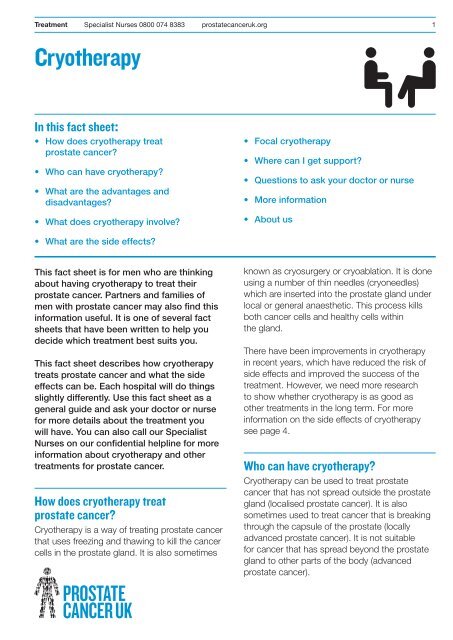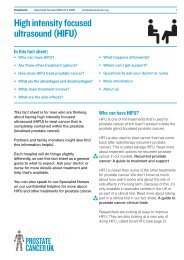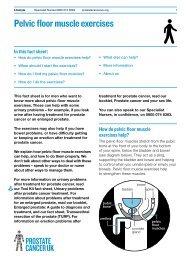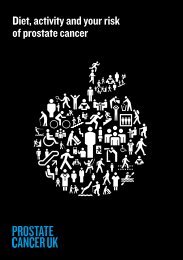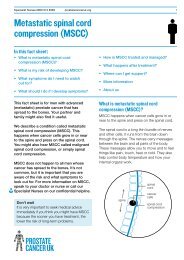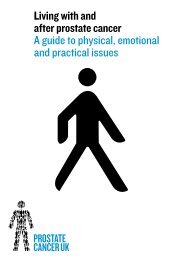Cryotherapy - Prostate Cancer Charity
Cryotherapy - Prostate Cancer Charity
Cryotherapy - Prostate Cancer Charity
Create successful ePaper yourself
Turn your PDF publications into a flip-book with our unique Google optimized e-Paper software.
Treatment Specialist Nurses 0800 074 8383 prostatecanceruk.org<br />
1<br />
<strong>Cryotherapy</strong><br />
In this fact sheet:<br />
• How does cryotherapy treat<br />
prostate cancer<br />
• Who can have cryotherapy<br />
• What are the advantages and<br />
disadvantages<br />
• What does cryotherapy involve<br />
• Focal cryotherapy<br />
• Where can I get support<br />
• Questions to ask your doctor or nurse<br />
• More information<br />
• About us<br />
• What are the side effects<br />
This fact sheet is for men who are thinking<br />
about having cryotherapy to treat their<br />
prostate cancer. Partners and families of<br />
men with prostate cancer may also find this<br />
information useful. It is one of several fact<br />
sheets that have been written to help you<br />
decide which treatment best suits you.<br />
This fact sheet describes how cryotherapy<br />
treats prostate cancer and what the side<br />
effects can be. Each hospital will do things<br />
slightly differently. Use this fact sheet as a<br />
general guide and ask your doctor or nurse<br />
for more details about the treatment you<br />
will have. You can also call our Specialist<br />
Nurses on our confidential helpline for more<br />
information about cryotherapy and other<br />
treatments for prostate cancer.<br />
How does cryotherapy treat<br />
prostate cancer<br />
<strong>Cryotherapy</strong> is a way of treating prostate cancer<br />
that uses freezing and thawing to kill the cancer<br />
cells in the prostate gland. It is also sometimes<br />
known as cryosurgery or cryoablation. It is done<br />
using a number of thin needles (cryoneedles)<br />
which are inserted into the prostate gland under<br />
local or general anaesthetic. This process kills<br />
both cancer cells and healthy cells within<br />
the gland.<br />
There have been improvements in cryotherapy<br />
in recent years, which have reduced the risk of<br />
side effects and improved the success of the<br />
treatment. However, we need more research<br />
to show whether cryotherapy is as good as<br />
other treatments in the long term. For more<br />
information on the side effects of cryotherapy<br />
see page 4.<br />
Who can have cryotherapy<br />
<strong>Cryotherapy</strong> can be used to treat prostate<br />
cancer that has not spread outside the prostate<br />
gland (localised prostate cancer). It is also<br />
sometimes used to treat cancer that is breaking<br />
through the capsule of the prostate (locally<br />
advanced prostate cancer). It is not suitable<br />
for cancer that has spread beyond the prostate<br />
gland to other parts of the body (advanced<br />
prostate cancer).
Treatment Specialist Nurses 0800 074 8383 prostatecanceruk.org<br />
2<br />
<strong>Cryotherapy</strong> is usually used for men whose<br />
prostate cancer has come back after treatment<br />
with radiotherapy or brachytherapy (recurrent<br />
prostate cancer). It is less commonly offered as<br />
a first treatment for prostate cancer. However,<br />
it may be an option for men who are unable<br />
to have other treatments such as surgery or<br />
radiotherapy. For example men with heart<br />
problems (cardiovascular problems) may not<br />
be able to have surgery for prostate cancer.<br />
Men with severe urinary symptoms may not be<br />
suitable for cryotherapy as it can make these<br />
problems worse. If you have difficulty passing<br />
urine or have to pass urine frequently you may<br />
wish to discuss this with your doctor before<br />
choosing a treatment.<br />
<strong>Cryotherapy</strong> is newer than some of the other<br />
treatments for prostate cancer. We do not know<br />
as much about how effective it is in the long<br />
term, or the risk of side effects compared with<br />
other treatments. Researchers are studying<br />
better ways of carrying out cryotherapy. Because<br />
of this, it is only available in specialist centres<br />
in the UK, or as part of a clinical trial. You can<br />
find more information about clinical trials in our<br />
Tool Kit fact sheet, A guide to prostate cancer<br />
clinical trials.<br />
Your doctor or nurse should discuss all your<br />
treatment options with you. It is important that<br />
they give you information about the advantages,<br />
disadvantages and all the possible side effects of<br />
cryotherapy to help you decide whether it is right<br />
for you. Your options will depend on whether you<br />
have just been diagnosed, or if the cancer has<br />
come back after previous treatment.<br />
Other first treatment options for localised<br />
prostate cancer may include:<br />
• active surveillance<br />
• surgery to remove the prostate<br />
(radical prostatectomy)<br />
• external beam radiotherapy (EBRT), or<br />
• brachytherapy (a type of radiotherapy).<br />
You may also be offered high intensity focused<br />
ultrasound (HIFU). Like cryotherapy, it is not<br />
widely available in the UK and researchers are<br />
studying better ways of carrying it out. It may<br />
be available in specialist centres or as part<br />
of a clinical trial.<br />
You can find more information about all these<br />
treatments in our individual treatment Tool Kit<br />
fact sheets or you can call our Specialist Nurses<br />
on our confidential helpline.<br />
For more information about treatment options<br />
after your first treatment read our booklet,<br />
Recurrent prostate cancer: A guide to<br />
treatment and support.<br />
Unsure about your diagnosis and<br />
treatment options<br />
If you have any questions about your<br />
diagnosis you can ask your doctor or nurse.<br />
They will be happy to explain your test results<br />
and talk you through your treatment options.<br />
It is important you feel you have enough<br />
time and all the information you need before<br />
making a decision about treatment. We<br />
have more information about diagnosis and<br />
treatment in our Tool Kit.<br />
What are the advantages and<br />
disadvantages<br />
The advantages and disadvantages of<br />
cryotherapy may depend on whether you are<br />
having it as a first treatment for prostate cancer<br />
or because the cancer has come back after<br />
another treatment. There is a higher risk of<br />
side effects if you have already had treatment<br />
for prostate cancer. See page 4 for more<br />
information on side effects. You can ask your<br />
doctor or nurse if you are unsure about any of<br />
the advantages or disadvantages of cryotherapy.<br />
Advantages<br />
• <strong>Cryotherapy</strong> is less invasive than some other<br />
treatments, with little blood loss.<br />
• You will only be in hospital for a short time<br />
and recovery time is quick.
Treatment Specialist Nurses 0800 074 8383 prostatecanceruk.org<br />
3<br />
• <strong>Cryotherapy</strong> may be a treatment option<br />
if your cancer has come back after<br />
radiotherapy or brachytherapy.<br />
Disadvantages<br />
• Many men who have cryotherapy have long<br />
term erectile problems following treatment.<br />
• There is also a risk of other side effects which<br />
could affect your quality of life such as urinary<br />
problems and a small risk of bowel problems.<br />
• We do not know as much about how effective<br />
the treatment is in the long term (after 10 or<br />
15 years), compared with other treatments.<br />
• <strong>Cryotherapy</strong> is only available in specialist<br />
centres in the UK or as part of a clinical trial.<br />
What might be an advantage for one person<br />
may not be for someone else. Please talk to<br />
your doctor or nurse about your own situation.<br />
What does cryotherapy involve<br />
Each hospital will do things slightly differently,<br />
so ask your doctor or nurse for details of how<br />
they carry out the procedure.<br />
Before having treatment<br />
Your doctor or nurse may ask you to take some<br />
medicine, called a laxative, to help empty your<br />
bowels immediately before treatment. This will<br />
give your doctor a good view of the prostate<br />
gland during treatment using an ultrasound<br />
probe (see below).<br />
During treatment<br />
<strong>Cryotherapy</strong> is usually done under general<br />
anaesthetic so that you are asleep during the<br />
treatment. It is sometimes done under local<br />
anaesthetic so that you are awake but won’t<br />
feel anything.<br />
A tube, known as a warming catheter, is passed<br />
through your penis into your bladder. Warm<br />
liquid is circulated through the catheter during<br />
the treatment. This is to help prevent the tube<br />
which you pass urine through (your urethra) from<br />
freezing and being damaged during treatment.<br />
An ultrasound probe is inserted into your back<br />
passage. This allows your doctor to see an<br />
image of the prostate gland and make sure the<br />
cryotherapy needles are in the right place. Several<br />
thin needles, known as cryoneedles or cryoprobes,<br />
are then inserted into the prostate gland through<br />
the skin between the testicles and back passage<br />
(perineum). Probes to monitor temperature are also<br />
inserted into and around the prostate gland.<br />
Freezing gasses are passed down the needles,<br />
causing the temperature to drop to about –40 o C.<br />
This freezes and destroys the surrounding tissue.<br />
The prostate gland is then allowed to warm up,<br />
either naturally, or by passing a different gas<br />
through the needles to warm the gland more<br />
quickly. This is called a freeze-thaw cycle. The<br />
process of freezing and thawing is repeated.<br />
There are usually two freeze-thaw cycles but there<br />
may be more if you have a large prostate gland.<br />
The needles and probes are then removed and,<br />
after about 20 minutes, the warming catheter is<br />
also removed. Another tube, used to drain urine,<br />
will be passed into your bladder either through the<br />
penis (urethral catheter) or through a small cut in<br />
your abdomen (suprapubic catheter). This will be<br />
left in for one to two weeks after you go home. The<br />
whole process usually takes around two hours.<br />
Going home after treatment<br />
Most people can go home on the same day<br />
or the following day. It is normal to have some<br />
discomfort, and your doctor or nurse will tell you<br />
which pain-relieving drugs you can take. You will<br />
be given antibiotics to reduce the risk of infection<br />
which you will need to take for a few days after<br />
you go home. If your urine starts to smell strongly<br />
or if you have a temperature, contact your doctor<br />
or nurse. These could be signs of an infection and<br />
you may need more antibiotics.<br />
You will go home with a catheter in place to<br />
avoid any problems passing urine. This will be<br />
left in for one to two weeks. Your nurse will show<br />
you how to care for the catheter before you<br />
leave the hospital. Some treatment centres may<br />
also give you medication called alpha-blockers<br />
to relax the muscle in and around the prostate<br />
to help you pass urine.
Treatment Specialist Nurses 0800 074 8383 prostatecanceruk.org<br />
4<br />
When you have your catheter removed at the<br />
hospital it may be uncomfortable, but it should<br />
not be painful. You will need to stay for a few<br />
hours after the catheter has come out to check<br />
that you can pass urine without difficulty. You may<br />
wish to take some spare underwear and spare<br />
pair of trousers with you. In some centres your<br />
doctor or nurse may arrange for you to have your<br />
catheter removed at home.<br />
You may see some blood in your urine, both while<br />
the catheter is in and after it has come out. This<br />
is normal, and you should drink plenty of fluids to<br />
help clear the blood. If you are worried about it at<br />
all, contact your doctor or nurse for advice.<br />
You may also have some bruising and swelling of<br />
the skin around the testicles (scrotum), buttocks<br />
and inner thigh in the few weeks after the<br />
procedure. Your doctor or nurse may advise you<br />
to avoid long periods of standing for the first few<br />
weeks. You should be able to go back to your<br />
day-to-day activities as soon as you feel able<br />
to, although it may take a few weeks or months<br />
before you feel back to normal.<br />
What happens afterwards<br />
You will have follow-up appointments with your<br />
doctor or nurse at the hospital to check your<br />
recovery and monitor your response to the<br />
treatment. Your prostate specific antigen (PSA)<br />
level will be monitored regularly to help check<br />
how well the treatment has worked. How often<br />
will vary depending on the treatment centre, but<br />
you should have a PSA test about every three<br />
months for at least the first year, and every six<br />
months after that. You can ask your doctor or<br />
nurse how often you will have a test.<br />
If you had cryotherapy as a first treatment and<br />
your cancer starts to grow again, you may be<br />
able to have more cryotherapy. In some cases<br />
you may be offered radiotherapy or, rarely,<br />
surgery. If you had cryotherapy as a second<br />
treatment and your cancer starts to grow again,<br />
you will be offered hormone therapy.<br />
You can find more information about treatment<br />
options after cancer has come back in our<br />
booklet, Recurrent prostate cancer: A guide<br />
to treatment and support or you can call our<br />
Specialist Nurses on our confidential helpline.<br />
What are the side effects<br />
Like all treatments, cryotherapy can cause<br />
side effects. <strong>Cryotherapy</strong> will affect each man<br />
differently, and you may not get all of the side<br />
effects. The most common side effects include<br />
erection problems (see below) and urinary<br />
problems (see page 5).<br />
Many of the side effects of the treatment<br />
are caused when healthy tissues are frozen<br />
and damaged. There is a greater risk of side<br />
effects if you have already had radiotherapy or<br />
brachytherapy to treat prostate cancer. This is<br />
because these treatments may have already<br />
caused some damage to the tissues surrounding<br />
the prostate gland.<br />
Short term side effects<br />
Short term side effects include:<br />
• blood in the urine (haematuria)<br />
• difficulty or discomfort passing urine<br />
• bruising and swelling of the penis, skin<br />
around the testicles (scrotum), inner thigh<br />
and the area between your testicles<br />
and back passage (perineum), or<br />
• pain and bleeding where the needles<br />
were inserted.<br />
Mid or long term side effects<br />
Erectile dysfunction<br />
The most common long term side effect is<br />
difficulty getting or keeping an erection<br />
(erectile dysfunction). This is because the nerves<br />
responsible for erections can be damaged by<br />
the treatment. More than three quarters of<br />
men (over 75 per cent) will be unable to get an<br />
erection following cryotherapy. If sex is important to<br />
you, you should discuss with your doctor or nurse<br />
whether cryotherapy is a suitable treatment for you.<br />
Some men will find that they gradually get<br />
back their erections but for most men this is likely<br />
to be a long term problem. We do not know for
Treatment Specialist Nurses 0800 074 8383 prostatecanceruk.org<br />
5<br />
sure how many men will get their erections back.<br />
There are medical treatments available which may<br />
be helpful and you can discuss these with your<br />
doctor of nurse. Our Tool Kit fact sheet,<br />
Sex and prostate cancer gives more information<br />
on treatments for erectile dysfunction.<br />
If you are planning to father children in the future,<br />
it might be possible to store your sperm before<br />
having cryotherapy. Speak to your doctor or nurse.<br />
Urinary problems<br />
<strong>Cryotherapy</strong> can cause urinary problems<br />
including leaking urine (urinary incontinence)<br />
and having a weak or slow flow of urine. These<br />
problems usually improve with time. Up to one in<br />
twenty men (five per cent) who have cryotherapy<br />
as a first treatment will find that they leak urine<br />
to some degree. This is more likely if you have<br />
cryotherapy as a second treatment and affects<br />
up to one in six men. For some men this may<br />
improve with time. However for some men the<br />
problem will be long term and you may have to<br />
wear pads in your underwear either temporarily<br />
or permanently. Making some changes to your<br />
lifestyle, such as doing pelvic floor muscle<br />
exercises may help to improve urinary problems<br />
or make them easier to manage. You can<br />
read about these in our Tool Kit fact sheet,<br />
Pelvic floor muscle exercises.<br />
A recent study found that about four in every<br />
hundred men who had cryotherapy as a first<br />
treatment had a weak or slow flow of urine after<br />
treatment. This is more likely if cryotherapy is<br />
a second treatment, affecting up to one in five<br />
men. The problem can be caused by swelling<br />
of the prostate gland and may pass in time.<br />
In a small number of cases a weak or slow flow<br />
of urine can be caused by damage to the tube<br />
that carries urine out through the penis (urethra).<br />
Small pieces of dead tissue are passed through<br />
the urethra (urethral sloughing) and may cause<br />
a blockage, making it difficult or impossible<br />
to pass urine. This can affect up to three out<br />
of every 100 men (three per cent) who have<br />
cryotherapy. Having a catheter for a short while<br />
may ease the problem or if necessary you can<br />
have an operation to help this.<br />
There is also a small risk that the urethra may<br />
become narrowed (stricture) after treatment.<br />
This will also cause a weak or slow flow of urine.<br />
Some men may need to have a procedure in<br />
hospital to help with this.<br />
Speak to your doctor or nurse if you are having<br />
difficulty passing urine. You can read more about<br />
urinary problems and possible treatments in<br />
our Tool Kit fact sheet, Urinary problems after<br />
prostate cancer treatment.<br />
Bowel problems<br />
A small number of men may get a complication<br />
where a hole forms between the back passage<br />
(rectum) and the tube which carries urine<br />
through the penis (urethra). This is known as a<br />
fistula, and is rare in men having cryotherapy<br />
as a first treatment. It is more likely, though still<br />
uncommon, if you have had an earlier treatment<br />
for prostate cancer which may have damaged<br />
the wall of the back passage. It can affect up to<br />
two out of every 100 men (up to two per cent).<br />
Fistulas can develop up to several weeks after<br />
cryotherapy. Sometimes pain and infections of the<br />
urethra can be early signs of a fistula, although<br />
these can also be caused by something else.<br />
Contact your doctor or nurse if your urine is<br />
strong smelling or you have a temperature, which<br />
could be signs of an infection. Discharge from the<br />
urethra or back passage or diarrhoea may also be<br />
signs of a fistula. If you develop a fistula, you will<br />
need to have an operation to repair the hole.<br />
Pain<br />
It is normal to experience some pain or<br />
discomfort after having cryotherapy. This can<br />
be managed with pain-relieving drugs and your<br />
doctor or nurse should tell you which you can<br />
take. However some men will have pain that<br />
lasts for a few weeks or months. The pain may<br />
be in the area in or around the penis, testicles<br />
and back passage. There is a greater risk of<br />
pain if you have had another treatment before<br />
cryotherapy. Antibiotics may help and the pain<br />
will usually improve. Speak to your doctor of<br />
nurse if you have any pain.
Treatment Specialist Nurses 0800 074 8383 prostatecanceruk.org<br />
6<br />
Focal cryotherapy<br />
Some specialists are looking at a new way of<br />
using cryotherapy called focal cryotherapy. This<br />
means that cryotherapy is used to treat only<br />
the areas of the prostate gland where there is<br />
cancer, rather than treating the whole gland. The<br />
aim is to avoid the side effects of cryotherapy by<br />
leaving healthy tissue unharmed. This is a new<br />
area of research and we need more information<br />
about how successful this treatment option is<br />
before it is made widely available.<br />
Where can I get support<br />
As well as getting medical help to treat your<br />
cancer, you may find that it helps to talk to family<br />
or friends about how you are feeling. Sharing<br />
concerns can make any decisions about your<br />
treatment easier to deal with. You could also<br />
speak to your doctor or nurse or you can call our<br />
Specialist Nurses on our confidential helpline.<br />
Partners and family also often worry about their<br />
loved one, and may find it helpful to talk to your<br />
doctor or nurse or call our Specialist Nurses on<br />
our confidential helpline.<br />
Some people find that it helps to talk to other<br />
men who have had cryotherapy. There are<br />
prostate cancer support groups throughout the<br />
country. You can ask your doctor or nurse for<br />
details, or you can find a list of support groups<br />
on our website at prostatecanceruk.org<br />
You might find it helpful to speak to someone<br />
who has been affected by prostate cancer. Our<br />
peer support volunteers are men and women<br />
who have personal experiences of prostate<br />
cancer. They are trained to listen and offer<br />
support over the telephone. Call our Specialist<br />
Nurses on our confidential helpline.<br />
Questions to ask your doctor or nurse<br />
You may find it helpful to keep a note of any questions you have<br />
to take to your next appointment.<br />
How successful is cryotherapy at treating prostate cancer<br />
What is the risk of side effects<br />
What are my other treatment options<br />
How much experience does the specialist have in carrying out cryotherapy<br />
How often will you check my PSA after the treatment
Treatment Specialist Nurses 0800 074 8383 prostatecanceruk.org<br />
7<br />
If you have access to the internet, you can<br />
sign up to our online community on our<br />
website, where you can share your views<br />
and experiences with others affected by<br />
prostate cancer. Our website address is<br />
prostatecanceruk.org<br />
If you would rather speak to a professional<br />
counsellor, you can ask your GP if there is one<br />
available on the NHS or you can get a list of<br />
private counsellors from The British Association<br />
for Counselling and Psychotherapy (see below).<br />
More information<br />
British Association for<br />
Counselling & Psychotherapy<br />
www.itsgoodtotalk.org.uk<br />
Phone 01455 883300<br />
Information about counselling and details of<br />
therapists in your area.<br />
<strong>Cancer</strong>Help UK<br />
www.cancerhelp.org.uk<br />
Nurse helpline 0808 800 4040<br />
<strong>Cancer</strong> Research UK’s patient information<br />
resource. It includes a database of clinical trials<br />
and advice on finding a trial.<br />
Healthtalkonline<br />
www.healthtalkonline.org<br />
Watch, listen to and read personal<br />
experiences of men with prostate cancer<br />
and other medical conditions.<br />
Macmillan <strong>Cancer</strong> Support<br />
www.macmillan.org.uk<br />
Helpline 0808 808 00 00<br />
Practical, financial and emotional support for<br />
people with cancer, their family and friends.<br />
National Institute for Health and Care<br />
Excellence (NICE)<br />
www.nice.org.uk<br />
Phone 0845 003 7780<br />
Guidelines for care and for the use of<br />
treatments and procedures on the NHS in<br />
England and Wales.<br />
UK <strong>Prostate</strong> Link<br />
www.prostate-link.org.uk<br />
Helps you find and compare reliable information<br />
about prostate cancer.<br />
About us<br />
<strong>Prostate</strong> <strong>Cancer</strong> UK fights to help more men<br />
survive prostate cancer and enjoy a better life.<br />
This fact sheet is part of the Tool Kit. You can<br />
order more Tool Kit fact sheets, including an<br />
A-Z of medical words, which explains some<br />
of the words and phrases used in this sheet.<br />
Download and order our free publications from<br />
our website at prostatecanceruk.org or call us<br />
on 0800 074 8383.<br />
At <strong>Prostate</strong> <strong>Cancer</strong> UK, we take great care to<br />
provide up-to-date, unbiased and accurate facts<br />
about prostate cancer. We hope these will add<br />
to the medical advice you have had and help you<br />
to make decisions. Our services are not intended<br />
to replace advice from your doctor.<br />
References to sources of information used in the<br />
production of this fact sheet are available at<br />
prostatecanceruk.org<br />
This publication was written and edited by:<br />
<strong>Prostate</strong> <strong>Cancer</strong> UK’s Information Team<br />
It was reviewed by:<br />
• Professor Damian Greene, Consultant<br />
Urologist, City Hospital, Sunderland<br />
• Susan Asterling, Urology Research Nurse,<br />
Sunderland Royal Hospital<br />
• Fiona Birrell, <strong>Cryotherapy</strong> Clinical Nurse<br />
Specialist, Gartnavel General Hospital<br />
• Hashim Ahmed, MRC Clinical Research<br />
Fellow (Uro-Oncology), Division of Surgery<br />
and Interventional Science, University<br />
College London<br />
• <strong>Prostate</strong> <strong>Cancer</strong> UK Volunteers<br />
• <strong>Prostate</strong> <strong>Cancer</strong> UK Specialist Nurses
Speak to our<br />
Specialist Nurses<br />
0800 074 8383*<br />
prostatecanceruk.org<br />
Donate today – help others like you<br />
Did you find this information useful Would you like to help others in your<br />
situation access the facts they need Every year, 40,000 men face a prostate<br />
cancer diagnosis. Thanks to our generous supporters, we offer information<br />
free to all who need it. If you would like to help us continue this service, please<br />
consider making a donation. Your gift could fund the following services:<br />
• £10 could buy a Tool Kit – a set of fact sheets, tailored to the needs of each<br />
man with vital information on diagnosis, treatment and lifestyle.<br />
• £25 could give a man diagnosed with a prostate problem unlimited time to<br />
talk over treatment options with one of our Specialist Nurses.<br />
To make a donation of any amount, please call us on 0800 082 1616,<br />
visit prostatecanceruk.org/donations or text PROSTATE to 70004*.<br />
There are many other ways to support us. For more details please visit<br />
prostatecanceruk.org/get-involved<br />
**You can donate up to £10 via SMS and we will receive 100% of your donation.<br />
Texts are charged at your standard rate. For full terms and conditions and more<br />
information, please visit prostatecanceruk.org/terms<br />
© <strong>Prostate</strong> <strong>Cancer</strong> UK July 2012<br />
To be reviewed July 2014<br />
Call our Specialist Nurses from Mon to Fri 9am - 6pm, Wed 10am - 8pm<br />
* Calls are recorded for training purposes only.<br />
Confidentiality is maintained between callers and <strong>Prostate</strong> <strong>Cancer</strong> UK.<br />
<strong>Prostate</strong> <strong>Cancer</strong> UK is a registered charity in England and Wales (1005541) and in Scotland (SC039332). Registered company number 2653887.<br />
2552 CRY/MAR14


